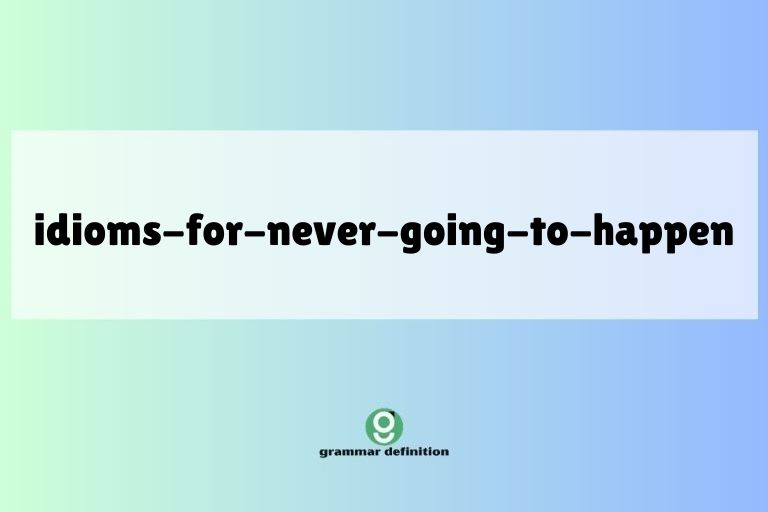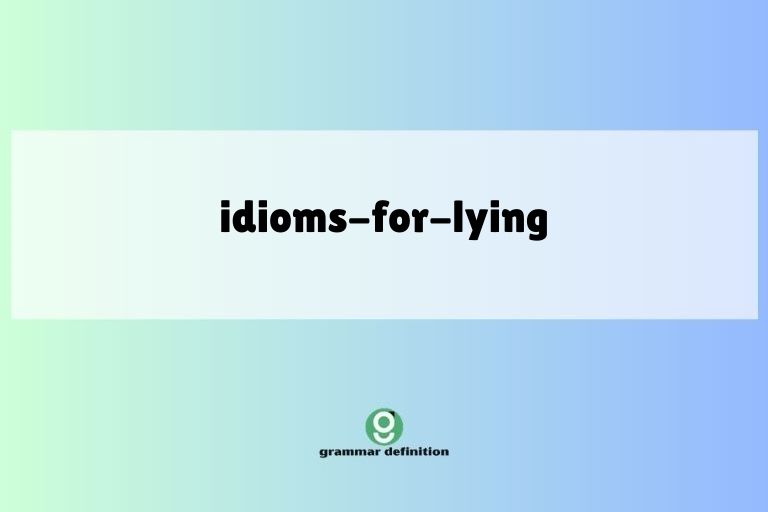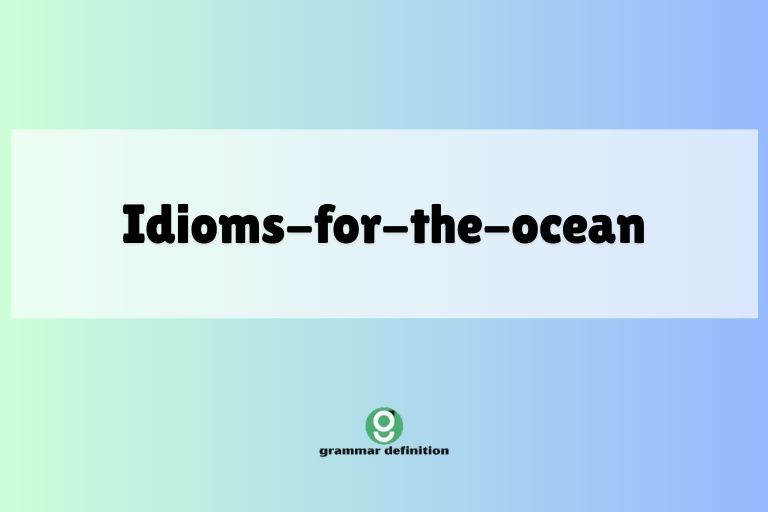Idioms for “Never Going to Happen”: A Comprehensive Guide

Idioms are a colorful and essential part of the English language, adding depth and nuance to our conversations. When we want to express that something is absolutely impossible or highly improbable, idioms provide a vivid and often humorous way to convey this idea.
This article delves into a variety of idioms used to express the concept of “never going to happen,” exploring their meanings, origins, and usage. Whether you’re an English language learner or a native speaker looking to expand your vocabulary, understanding these idioms will enhance your communication skills and add a touch of flair to your speech.
This guide is tailored for English language learners, educators, and anyone interested in mastering idiomatic expressions. By the end of this article, you’ll be able to confidently use these idioms in various contexts, understand their subtle differences, and avoid common mistakes.
So, let’s dive in and explore the fascinating world of idioms that signify impossibility!
Table of Contents
- Definition of Idioms for “Never Going to Happen”
- Structural Breakdown of These Idioms
- Types and Categories of Impossibility Idioms
- Examples of “Never Going to Happen” Idioms
- Usage Rules for Impossibility Idioms
- Common Mistakes When Using These Idioms
- Practice Exercises
- Advanced Topics: Nuances and Regional Variations
- Frequently Asked Questions
- Conclusion
Definition of Idioms for “Never Going to Happen”
An idiom is a phrase or expression whose meaning cannot be understood from the literal meanings of its individual words. Idioms for “never going to happen” are those that convey the idea that something is impossible, highly improbable, or has no chance of occurring.
These idioms often use figurative language, metaphors, and similes to create a strong and memorable image of impossibility.
Classification: These idioms fall under the broader category of figurative language and specifically express impossibility or extreme improbability. They are often used for emphasis or to add a humorous or sarcastic tone to a conversation.
Function: The primary function of these idioms is to communicate that an event or situation is not feasible or realistic. They can be used to dismiss a suggestion, express doubt, or emphasize the unlikelihood of a particular outcome. They also add color and personality to language, making it more engaging and expressive.
Contexts: These idioms are used in a wide range of contexts, from informal conversations to formal speeches. The specific idiom chosen will often depend on the audience, the tone of the conversation, and the level of formality required. Some idioms are more appropriate in casual settings, while others are suitable for more professional or academic environments. Understanding the context is crucial for using these idioms effectively.
Structural Breakdown of These Idioms
The structure of idioms for “never going to happen” varies widely, but they generally follow a pattern of using figurative language to represent impossibility. Here’s a breakdown of common structural elements:
- Figurative Language: Many idioms rely on metaphors, similes, or hyperbole to create an image of impossibility. For example, “when pigs fly” uses the impossible image of pigs flying to signify that something will never happen.
- Conditional Clauses: Some idioms are structured as conditional clauses, often using “if” or “when” to set up the impossible condition. For instance, “if hell freezes over” implies that the stated event will only occur under the impossible condition of hell freezing.
- Exaggeration: Hyperbole, or exaggeration, is often used to emphasize the unlikelihood of an event. An example is “a snowball’s chance in hell,” which exaggerates the vulnerability of a snowball in a hot environment to highlight the slim chances of success.
- Absurdity: Some idioms use absurd or illogical scenarios to convey impossibility. “Trying to nail jelly to a wall” presents a nonsensical image that represents a futile effort.
Understanding these structural elements can help you recognize and interpret new idioms more easily. By analyzing the figurative language, conditional clauses, exaggerations, or absurdities used in an idiom, you can often infer its meaning even if you’ve never heard it before.
Types and Categories of Impossibility Idioms
Idioms for “never going to happen” can be categorized based on the type of imagery or figurative language they employ. Here are some common categories:
1. Animal-Related Idioms
These idioms use animal imagery to represent impossibility, often focusing on animals performing actions that are contrary to their nature.
Examples: “When pigs fly,” “When cows come home,” “A cat in hell’s chance.”
2. Environmental/Natural Phenomenon Idioms
These idioms refer to impossible or highly improbable natural events or conditions.
Examples: “If hell freezes over,” “When the sun rises in the west,” “A snowball’s chance in hell.”
3. Action-Related Idioms
These idioms involve actions that are inherently impossible or extremely difficult to perform.
Examples: “Trying to nail jelly to a wall,” “Trying to catch the wind,” “Teach an old dog new tricks.”
4. Chance-Related Idioms
These idioms emphasize the lack of any possibility or chance of something happening.
Examples: “Not a hope in hell,” “No chance in the world,” “Slim to none.”
5. Time-Related Idioms
These idioms suggest that an event is so far off in the future that it’s practically never going to happen.
Examples: “In a month of Sundays,” “When the seas run dry,” “Not in a million years.”
Examples of “Never Going to Happen” Idioms
Here are some examples of idioms that convey the idea of “never going to happen,” categorized for clarity and ease of understanding.
Table 1: Animal-Related Idioms
This table lists idioms related to animals that suggest an event is impossible.
| Idiom | Meaning | Example Sentence |
|---|---|---|
| When pigs fly | Something that will never happen. | “He’ll clean his room when pigs fly!” |
| When cows come home | A very long time; never. | “You can wait for him to apologize until the cows come home.” |
| A cat in hell’s chance | No chance at all. | “He doesn’t have a cat in hell’s chance of winning the election.” |
| A snowball’s chance in hell | Extremely unlikely to succeed. | “Trying to convince him is like giving a snowball a chance in hell.” |
| When fish learn to sing | Something that will never happen. | “She’ll admit she’s wrong when fish learn to sing.” |
| If dogs can whistle | Something that is impossible or highly improbable. | “He’ll start being on time if dogs can whistle.” |
| Until the chickens have teeth | Never; something that will not happen. | “He’ll pay you back until the chickens have teeth.” |
| When donkeys fly | Something that is completely impossible. | “They’ll agree on something when donkeys fly.” |
| When hens grow teeth | Never; something that will never happen. | “She’ll apologize when hens grow teeth.” |
| If frogs had wings | Suggests something is impossible or highly unlikely. | “He’d be a good leader if frogs had wings.” |
| When monkeys learn to type | Something that is highly improbable or impossible. | “She will finish the project when monkeys learn to type.” |
| If horses had wings | Implies something is impossible or purely hypothetical. | “He would be famous if horses had wings.” |
| Until the cows jump over the moon | Never; indicating something that will not occur. | “He will admit defeat until the cows jump over the moon.” |
| When pigs have wings | Similar to “when pigs fly,” indicating impossibility. | “They’ll reconcile when pigs have wings.” |
| If elephants could fly | Implies something is impossible or imaginary. | “He’d travel the world if elephants could fly.” |
| Before the birds start walking | Never; suggesting something will never happen. | “She will understand the theory before the birds start walking.” |
| When cats bark | Something that will never happen. | “He’ll be on time when cats bark.” |
| When snakes wear shoes | Indicating something impossible or absurd. | “They’ll agree when snakes wear shoes.” |
| If squirrels could sing opera | Implies something is highly unlikely or impossible. | “She’d win the competition if squirrels could sing opera.” |
| When turtles fly | Something that will never occur. | “He’ll admit he was wrong when turtles fly.” |
Table 2: Environmental/Natural Phenomenon Idioms
This table features idioms that use natural phenomena to illustrate impossibility.
| Idiom | Meaning | Example Sentence |
|---|---|---|
| If hell freezes over | Something that will never happen. | “I’ll agree with you if hell freezes over.” |
| When the sun rises in the west | Something that is impossible. | “He’ll apologize when the sun rises in the west.” |
| A snowball’s chance in hell | Extremely unlikely to succeed. | “He has about a snowball’s chance in hell of getting the job.” |
| When the seas run dry | Never; something that will not happen. | “I’ll stop loving you when the seas run dry.” |
| When it rains in the desert | Something that is highly improbable. | “He’ll call you back when it rains in the desert.” |
| When the moon turns blue | Something that will never happen. | “She’ll admit she’s wrong when the moon turns blue.” |
| If the stars fall from the sky | Suggests something is impossible or extremely unlikely. | “He’ll change his mind if the stars fall from the sky.” |
| When mountains move | Something that is highly improbable or impossible. | “They’ll reconcile when mountains move.” |
| When the rivers flow backward | Never; implying something that will not occur. | “She’ll forgive him when the rivers flow backward.” |
| If the sky turns green | Suggests something is impossible or purely hypothetical. | “He’d be happy if the sky turns green.” |
| When the earth stops spinning | Something that will never happen. | “She’ll be on time when the earth stops spinning.” |
| When the snow melts in July | Indicating something impossible or highly unlikely. | “He will finish the project when the snow melts in July.” |
| If the oceans boil | Implies something is impossible or purely hypothetical. | “He’d agree with you if the oceans boil.” |
| When the ice age returns | Never; suggesting something will never happen. | “They’ll be friends again when the ice age returns.” |
| When the sun freezes over | Something that is completely impossible. | “She will apologize when the sun freezes over.” |
| If the wind stands still | Suggests something is impossible or extremely unlikely. | “He’ll calm down if the wind stands still.” |
| When the tides stop turning | Never; implying something that will not occur. | “She’ll give up when the tides stop turning.” |
| When the rain stops falling upward | Something that is completely impossible. | “He’ll understand when the rain stops falling upward.” |
| If the trees start walking | Suggests something is impossible or purely hypothetical. | “She’d be happy if the trees start walking.” |
| When the rocks start floating | Something that will never happen. | “He’ll admit he was wrong when the rocks start floating.” |
Table 3: Action-Related Idioms
This table includes idioms related to actions that are impossible or extremely difficult.
| Idiom | Meaning | Example Sentence |
|---|---|---|
| Trying to nail jelly to a wall | Attempting something impossible or futile. | “Trying to get him to listen is like trying to nail jelly to a wall.” |
| Trying to catch the wind | Attempting something impossible or unattainable. | “Trying to control her emotions is like trying to catch the wind.” |
| Teach an old dog new tricks | Difficult to change someone’s habits or behavior. | “It’s hard to teach an old dog new tricks.” |
| Looking for hen’s teeth | Searching for something that does not exist. | “He’s looking for hen’s teeth if he thinks he’ll find a honest politician.” |
| Waiting for the dead to speak | Waiting for something that will never happen. | “You’ll be waiting for the dead to speak if you expect him to apologize.” |
| Trying to get blood from a stone | Trying to obtain something from someone who is unwilling or unable to give it. | “Trying to get him to donate is like trying to get blood from a stone.” |
| Trying to squeeze water from a stone | Attempting something impossible or futile. | “Trying to make him understand is like trying to squeeze water from a stone.” |
| Looking for a needle in a haystack | Searching for something that is virtually impossible to find. | “Finding the document in that pile is like looking for a needle in a haystack.” |
| Trying to hold back the tide | Attempting to stop something that is inevitable. | “Trying to stop the change is like trying to hold back the tide.” |
| Trying to unscramble an egg | Attempting to reverse something that has already been done. | “Trying to fix the situation now is like trying to unscramble an egg.” |
| Waiting for paint to dry | Waiting for something extremely slow or boring. | “Watching him work is like waiting for paint to dry.” |
| Trying to herd cats | Trying to control or organize a group of uncooperative people. | “Managing that team is like trying to herd cats.” |
| Trying to fly to the moon on a broomstick | Attempting something utterly impossible. | “Thinking he can win the race is like trying to fly to the moon on a broomstick.” |
| Trying to build a castle in the air | Pursuing unrealistic dreams or plans. | “His plans are just castles in the air.” |
| Trying to swim against the current | Struggling against overwhelming opposition. | “Arguing with him is like trying to swim against the current.” |
| Trying to fight a losing battle | Engaging in a struggle that is certain to fail. | “Continuing the project is like trying to fight a losing battle.” |
| Trying to put toothpaste back in the tube | Attempting to reverse something that has already been done. | “Trying to undo the damage is like trying to put toothpaste back in the tube.” |
| Trying to teach a fish to climb a tree | Attempting to teach someone something they are inherently unable to do. | “Trying to teach him to dance is like trying to teach a fish to climb a tree.” |
| Trying to make a silk purse out of a sow’s ear | Attempting to create something valuable from poor materials. | “Trying to make that project successful is like trying to make a silk purse out of a sow’s ear.” |
| Trying to square the circle | Attempting something that is logically impossible. | “Trying to find a solution that pleases everyone is like trying to square the circle.” |
Table 4: Chance-Related Idioms
This table lists idioms related to the lack of any chance or possibility.
| Idiom | Meaning | Example Sentence |
|---|---|---|
| Not a hope in hell | No chance at all. | “He doesn’t have a hope in hell of passing the exam.” |
| No chance in the world | Absolutely no possibility. | “There’s no chance in the world that she’ll agree to that.” |
| Slim to none | Very unlikely; almost impossible. | “The chances of him winning are slim to none.” |
| A long shot | A venture unlikely to succeed. | “Applying for that job is a long shot, but I’ll try anyway.” |
| Against all odds | Despite seeming impossible. | “Against all odds, he managed to win the game.” |
| Not a prayer | No chance at all. | “He doesn’t have a prayer of getting the promotion.” |
| A fool’s errand | A pointless or futile task. | “Trying to convince him is a fool’s errand.” |
| Without a shadow of a doubt | Certainly; definitely (used ironically to mean the opposite). | “Without a shadow of a doubt, he’ll fail the test (ironically).” |
| Out of the question | Not possible; not allowed. | “Going on vacation this year is out of the question.” |
| A pie in the sky | An unrealistic or impractical idea. | “His plans for the company are just pie in the sky.” |
| Fat chance | Very little or no chance at all. | “Fat chance he’ll clean his room.” |
| No dice | No luck; no success. | “I asked for a raise, but it was no dice.” |
| No way, no how | Absolutely not. | “Am I going to help him? No way, no how!” |
| A shot in the dark | A wild guess or attempt. | “Applying for the job was a shot in the dark.” |
| Highly improbable | Very unlikely to happen. | “It’s highly improbable that he’ll arrive on time.” |
| A wild goose chase | A pointless and fruitless search. | “Looking for that information turned out to be a wild goose chase.” |
| A pipe dream | An unrealistic or fanciful hope or scheme. | “His plans to become a millionaire are just a pipe dream.” |
| A fool’s paradise | A state of happiness based on false hopes. | “He’s living in a fool’s paradise if he thinks she’ll come back.” |
| Against the odds | Unlikely to happen, but still possible. | “Against the odds, they managed to win the championship.” |
| Not a glimmer of hope | Very little or no hope at all. | “There’s not a glimmer of hope that he’ll pass the course.” |
Table 5: Time-Related Idioms
This table presents idioms that express impossibility through the concept of time.
| Idiom | Meaning | Example Sentence |
|---|---|---|
| In a month of Sundays | Never; a very long time. | “He’ll finish the project in a month of Sundays.” |
| Not in a million years | Never; absolutely not. | “I would never do that, not in a million years.” |
| Once in a blue moon | Very rarely; almost never. | “We only see each other once in a blue moon.” |
| When hell freezes over | Something that will never happen. | “I’ll agree with you when hell freezes over.” |
| When two Sundays come together | Never; something that will not happen. | “He’ll pay you back when two Sundays come together.” |
| In donkey’s years | A very long time. | “I haven’t seen him in donkey’s years.” |
| When the stars align | When the circumstances are perfectly right. | “We’ll succeed when the stars align.” |
| When time stands still | Something that will never happen. | “He’ll apologize when time stands still.” |
| Not in a dog’s age | A very long time. | “I haven’t been there in a dog’s age.” |
| When pigs sprout wings | Something that will never happen. | “She will believe you when pigs sprout wings.” |
Usage Rules for Impossibility Idioms
Using idioms correctly requires understanding their specific meanings and contexts. Here are some key usage rules to keep in mind:
- Context Matters: Consider the audience and the setting. Some idioms are more appropriate for informal conversations, while others are suitable for formal situations. For example, “when pigs fly” is generally used in casual settings, while “highly improbable” is more appropriate for formal contexts.
- Don’t Overuse: While idioms can add color to your language, overuse can make your speech sound unnatural or contrived. Use them sparingly and only when they fit the context.
- Understand the Nuances: Each idiom has a slightly different connotation. Some are humorous, while others are more serious. Choose the idiom that best conveys the intended tone and meaning. For instance, “not a hope in hell” is more forceful than “slim to none.”
- Avoid Literal Interpretations: Idioms should not be interpreted literally. Their meaning is figurative and often unrelated to the individual words they contain.
- Be Aware of Regional Variations: Some idioms are more common in certain regions or dialects. Be mindful of your audience and use idioms that they are likely to understand.
By following these usage rules, you can effectively incorporate idioms into your speech and writing, enhancing your communication skills and adding a touch of personality to your language.
Common Mistakes When Using These Idioms
Even experienced English speakers can make mistakes when using idioms. Here are some common errors to avoid:
- Literal Interpretation: Interpreting idioms literally is a common mistake. Remember that idioms have figurative meanings that are different from the sum of their individual words.
- Incorrect Word Order: Changing the word order of an idiom can alter its meaning or make it nonsensical. Always use the correct word order.
- Misunderstanding the Meaning: Using an idiom in the wrong context or with an incorrect understanding of its meaning can lead to miscommunication.
- Overusing Idioms: Using too many idioms in a short period can make your speech sound unnatural and forced.
- Mixing Idioms: Combining parts of different idioms can create confusion and make your speech difficult to understand.
Here are some examples of correct and incorrect usage:
| Incorrect | Correct | Explanation |
|---|---|---|
| “When cows fly” | “When pigs fly” | The correct idiom is “when pigs fly,” not “when cows fly.” |
| “He has a snowball’s chance in heaven” | “He has a snowball’s chance in hell” | The correct idiom is “a snowball’s chance in hell,” which emphasizes the unlikelihood of success. |
| “Not a hope at all” | “Not a hope in hell” | The correct idiom is “not a hope in hell,” which is a stronger expression of impossibility. |
| “Trying to nail water to a wall” | “Trying to nail jelly to a wall” | The correct idiom is “trying to nail jelly to a wall”, which represents a futile effort. |
Practice Exercises
Test your understanding of idioms for “never going to happen” with these practice exercises.
Exercise 1: Fill in the Blanks
Complete the following sentences with the correct idiom from the list below.
Idiom List: When pigs fly, If hell freezes over, A snowball’s chance in hell, Not a hope in hell, Trying to nail jelly to a wall, When the sun rises in the west, Slim to none, In a month of Sundays, No chance in the world, When cows come home
| Question | Answer |
|---|---|
| 1. He’ll clean his room _______________. | When pigs fly |
| 2. I’ll agree with you _______________. | If hell freezes over |
| 3. He has _______________ of getting the job. | A snowball’s chance in hell |
| 4. She has _______________ of winning the lottery. | Not a hope in hell |
| 5. Trying to convince him is like _______________. | Trying to nail jelly to a wall |
| 6. He’ll apologize _______________. | When the sun rises in the west |
| 7. The chances of him arriving on time are _______________. | Slim to none |
| 8. He’ll finish the project _______________. | In a month of Sundays |
| 9. There’s _______________ that she’ll agree to that. | No chance in the world |
| 10. You can wait for him to apologize until _______________. | When cows come home |
Exercise 2: Multiple Choice
Choose the correct meaning of the idiom in each sentence.
| Question | Options | Answer |
|---|---|---|
| 1. “He’ll pay you back when the seas run dry.” What does this mean? | a) He’ll pay you back soon. b) He’ll never pay you back. c) He’ll pay you back when he has the money. | b) He’ll never pay you back. |
| 2. “Trying to catch the wind is pointless.” What does this mean? | a) It’s easy to catch the wind. b) It’s impossible to catch the wind. c) It’s fun to catch the wind. | b) It’s impossible to catch the wind. |
| 3. “He doesn’t have a prayer of passing the exam.” What does this mean? | a) He’s likely to pass the exam. b) He might pass the exam. c) He’s very unlikely to pass the exam. | c) He’s very unlikely to pass the exam. |
| 4. “She’ll admit she’s wrong once in a blue moon.” What does this mean? | a) She admits she’s wrong frequently. b) She rarely admits she’s wrong. c) She always admits she’s wrong. | b) She rarely admits she’s wrong. |
| 5. “His plans are just a pie in the sky.” What does this mean? | a) His plans are realistic. b) His plans are delicious. c) His plans are unrealistic. | c) His plans are unrealistic. |
| 6. “He’ll be on time if dogs can whistle.” What does this mean? | a) He’s always on time. b) He’ll never be on time. c) He’s sometimes on time. | b) He’ll never be on time. |
| 7. “They’ll agree when snakes wear shoes.” What does this mean? | a) They always agree. b) They might agree. c) They’ll never agree. | c) They’ll never agree. |
| 8. “She will finish the project when monkeys learn to type.” What does this mean? | a) She’ll finish the project quickly. b) She’ll never finish the project. c) She’ll finish the project soon. | b) She’ll never finish the project. |
| 9. “He’d travel the world if elephants could fly.” What does this mean? | a) He’ll travel the world soon. b) He’ll never travel the world. c) He might travel the world. | b) He’ll never travel the world. |
| 10. “She’ll apologize when hens grow teeth.” What does this mean? | a) She always apologizes. b) She’ll never apologize. c) She sometimes apologizes. | b) She’ll never apologize. |
Exercise 3: Sentence Completion
Complete each sentence using an appropriate idiom from the list provided. Use each idiom only once.
Idiom List: a fool’s errand, no way, no how, against all odds, a long shot, out of the question, fat chance, not a glimmer of hope, a shot in the dark, trying to herd cats, a pipe dream
| Question | Answer | |
|---|---|---|
| 1. Trying to get everyone to agree on the new policy is like _______________. | trying to herd cats | |
| 2. Asking him for money is _______________; he never lends anyone anything. | a fool’s errand | |
| 3. I asked my boss for a week off in December, but it was _______________. | out of the question | |
| 4. _______________ that I’m going to clean your room for you! | No way, no how | |
| 5. It’s _______________ he’ll actually show up on time. | a pipe dream | |
| 6. Applying for that scholarship is _______________, but I’m going to try anyway. | a long shot | |
| 7. _______________ that the team will win the championship this year. | Not a glimmer of hope | |
| 8. _______________, the small business managed to survive the economic downturn. | Against all odds | |
| 9. _______________ | Applying for the internship was _______________, but I learned a lot from the experience. | a shot in the dark |
| 10. _______________ he’ll actually do what he promised. | Fat chance |
Advanced Topics: Nuances and Regional Variations
Understanding the nuances and regional variations of idioms for “never going to happen” can further enhance your mastery of the English language. Here are some advanced topics to consider:
1. Cultural Context
Idioms often reflect the cultural values, beliefs, and experiences of a particular group of people. Understanding the cultural context behind an idiom can provide deeper insights into its meaning and usage.
For example, idioms related to weather or agriculture may be more common in rural areas, while idioms related to urban life may be more prevalent in cities.
2. Historical Origins
Many idioms have historical origins that shed light on their meanings. Researching the history of an idiom can reveal fascinating stories and provide a richer understanding of its cultural significance.
For instance, the idiom “when pigs fly” may have originated from medieval folklore or agricultural practices.
3. Regional Variations
Idioms can vary significantly from one region or dialect to another. What is a common idiom in one part of the world may be unfamiliar or even nonsensical in another.
Being aware of these regional variations can help you avoid miscommunication and use idioms that are appropriate for your audience. For example, some idioms may be more common in British English than in American English, or vice versa.
4. Nuances in Meaning
Even within the same language and culture, idioms can have subtle nuances in meaning. Some idioms may be more emphatic or humorous than others, while others may be more formal or informal.
Paying attention to these nuances can help you choose the idiom that best conveys your intended message.
5. Evolution of Idioms
Idioms are not static; they evolve over time as language and culture change. New idioms emerge, old idioms fall out of use, and the meanings of existing idioms can shift.
Staying up-to-date with these changes can help you use idioms correctly and avoid sounding outdated or out of touch.
Frequently Asked Questions
What is the difference between an idiom and a proverb?
An idiom is a phrase whose meaning is different from the literal meanings of its individual words (e.g., “when pigs fly”). A proverb is a short, well-known saying that expresses a general truth or piece of advice (e.g., “actions speak louder than words”).
How can I improve my understanding of idioms?
Read widely, listen to native speakers, and use idioms in your own speech and writing. Pay attention to the context in which idioms are used, and don’t be afraid to ask for clarification if you’re unsure of their meaning.
Are idioms translatable?
Idioms are often difficult to translate directly because their meanings are figurative and culturally specific. However, many languages have their own idioms that express similar ideas.
Is it okay to use idioms in formal writing?
It depends on the context and the audience. In general, it’s best to avoid using idioms in highly formal or academic writing.
However, they can be appropriate in less formal contexts, such as business reports or personal essays.
How do I avoid making mistakes when using idioms?
Study idioms carefully, pay attention to their usage in context, and practice using them in your own speech and writing. If you’re unsure of an idiom’s meaning or usage, it’s best to err on the side of caution and choose a more straightforward expression.
Why are idioms important in English?
Idioms add color, depth, and nuance to the English language. They can make your speech and writing more engaging, expressive, and memorable.
Understanding idioms is also essential for comprehending the speech and writing of native English speakers.
Can idioms be offensive?
Yes, some idioms can be offensive, particularly if they are based on stereotypes or discriminatory attitudes. Be mindful of the potential impact of your words, and avoid using idioms that could be hurtful or offensive to others.
Conclusion
Mastering idioms for “never going to happen” can significantly enhance your English language skills and add a vibrant, expressive layer to your communication. By understanding their meanings, structures, and usage rules, you can confidently incorporate these idioms into your speech and writing.
Remember to consider the context, avoid common mistakes, and be aware of regional variations to use them effectively. Whether you’re expressing doubt, dismissing a suggestion, or adding a touch of humor, these idioms provide a colorful and memorable way to convey impossibility.
Keep practicing, stay curious, and enjoy the richness and diversity of the English language!






